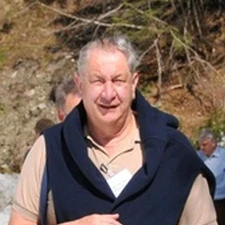Malcolm Barrie Hart

The 2011 Jean Baptiste Lamarck Medal is awarded to Malcolm Barrie Hart the Jean Baptiste Lamarck Medal is awarded to Malcolm Barrie Hart for his internationally acclaimed research on the taxonomy, evolution, ecology and applied biostratigraphy of foraminifera, including the origin of planktonic foraminifera, the causes and consequences of oceanic anoxia and mass extinction events, and the local biotic impact of volcanic eruptions.
Malcolm Barrie Hart is an internationally renowned micro-palaeontologist whose work over a period of more than 40 years has led to fundamental advances in knowledge of the taxonomy, evolution, ecology and biostratigraphy of foraminifera. He has published over 180 research papers, edited 8 books and supervised 35 PhD students. Hart’s main research interest is micro-palaeontology, especially foraminifera. His work has had a significant impact on our understanding of the depth distribution of foraminifera (publishing a seminal work in Nature); of the origin of the planktonic foraminifera; and of the major episodes of oceanic anoxia and mass extinction during the Mesozoic, in particular the end-Cretaceous, Cenomanian-Turonian, and Pliensbachian-Toarcian events. More recently, he has been studying Pleistocene Caribbean foraminifera and pteropods in order to assess the impact of past eruptions of Montserrat on the local marine communities. He is presently undertaking research into the effects of ocean acidification, ancient and modern, on foraminifera, pteropods and other marine taxa. Malcolm Hart obtained his BSc and PhD at Imperial College (University of London). His PhD research was based on the detailed study of Cretaceous foraminifera in order to provide a preliminary biostratigraphic framework for the construction of the Channel Tunnel, one of the largest European geoscience-related projects of the past 40 years. This work established a framework that continues to underpin current Upper Cretaceous biostratigraphic schemes for northern Europe. Following a position at the University of Newcastle, Malcolm moved to Plymouth in 1972, where he has held a succession of high-level appointments including: Head of Department of Geological Sciences; Director of Research; Associate Dean of Science (Research); and Pro Vice-Chancellor (Research & Enterprise). He was awarded the title of Professor of Micropalaeontology in 1982, a mere 12 years after completing his PhD, and a DSc (by the University of London) in 1993. Hart’s palaeontological research has had a significant and lasting impact in the fields of stratigraphy and applied geosciences. He is Chair of the Albian Working Group of the International Subcommission on Cretaceous Stratigraphy and has been involved in the GSSP definitions for the base of the Sinemurian and Pliensbachian stages. He is currently working on the GSSP definitions for the base of the Toarcian and Oxfordian stages. Much of Hart’s work has been of significance to the hydrocarbons industry, but two projects stand out as unique endeavours with significant socio-economic impact for western Europe: the construction of the Channel Tunnel between France and the UK, that required precise correlation within the Chalk succession; and the site investigation for the construction of the Thames Barrier, which demanded a detailed understanding of Chalk biostratigraphy. Much of this work was eventually published in the two editions (1982, 1989) of the Stratigraphical Atlas of Fossil Foraminifera, still widely consulted and cited throughout academia and industry. During his long and distinguished career, Malcolm Hart has served a number of palaeontological and other societies, including The Micropalaeontological Society (as Chair), The Palaeontological Association (as Council Member), and The European Palaeontological Association (as President). He has championed the conservation of UK geological sites, and assisted in the submission that led to World Heritage Site status for the “Jurassic Coast” in Southern England and the award of European Geopark status to the English Riviera (Torbay, UK).
